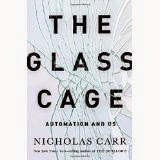ISBN:
978-0-393-24076-4
Publisher:
Norton
Hardcover
Pages:
276
Photographs/Maps:
0
There
are two well known axioms that are often used to describe the human condition:
"Knowledge is power" and "That which does not kill you, makes
you stronger". Both seem, on the surface, to be both logical and
unassailable; however, Carr's work, The Glass Cage, challenges the notion that
the advancement of technology and its assumption of greater importance and a
more central role in every facet of our lives, is making us stronger or more
powerful as a society.
Carr's
central theme suggests that the advancement of automation in the world has not
only made our lives easier in the sense that many of the mundane tasks that
used to occupy our time are now accomplished by computers, but that it has also
progressed to the point where the level of automation is no longer an
enhancement of but a replacement for mankind. Human kind has now become a
monitor/spectator to many of our daily activities.
He
draws upon a number of studies from a variety of disciplines that point to a
gradual but marked decline in the capacity of humans to fend and think for
themselves. Writing programs have autocorrect functions, shopping has targeted
advertising, aircraft are automated such that pilots need only monitor,
medicine has automated diagnostic systems, factories create systems that
require little to no interface with human operators and gaming
systems/communication technologies remove us further from actual face to face
interaction. Carr acknowledges that, in and of themselves, these are not all negative
advances and that there are practical benefits to be gained from applying
technology. However, he suggests, given the gradual, insidious nature of the
reliance that society has come to have on technology, that it has repercussions
not only from an employment/societal perspective but also from a physical and
psychological evaluation of who we are as humans.
Carr
presents that as we diminish our requirement to learn and, just as importantly,
practise what we learn, our brains are undergoing physical change and, in some
respects, atrophying; the same may be said for our ability to communicate and
interact. These skills, like any, need to be used or they are lost. Carr backs
up his assertions with practical examples and reference to numerous studies
from the fields of medicine, ergonomics and psychology.
He
also, contends that the advent of technology as a replacement for the human in
an equation is having the more subtle effect of raising the question of what is
our role in the world. Are pilots still pilots if they are not physically
flying the airplane and, as some may argue, they are no longer required in the
cockpit at all? What is the role of a machinist if they are merely monitoring
the equipment producing the good and what training and expertise do they really
require?
The
West has become imbued with the idea that technology is a good thing and that
there is little that it cannot do given time and development. While this may be
true Carr advises that the computer works in the world of absolutes and has
difficulty when faced with issues requiring subjective evaluation. He uses as
an example the case where a driverless car must decide whether to hit a child
who has run into the street or swerve into oncoming traffic thereby causing an
accident that potentially kills its passengers. Additionally, the computer is
only as good as the information and programming that goes into it. There are
examples of technologies that are able to 'learn' and this will inevitably
improve in the future but for now there are still some significant limitations
on this ability.
Why
is all of this relevant to the leader of the future? I would contend that the
further we remove ourselves from interaction with people and the practical
world around us, the less capable we will be at dealing with situations and
circumstances requiring decision making and those where the technological
resources are not available. How well do we function today without smart phones
and the internet? Technological development is not a bad thing but like
anything it must be understood in the broader context of its impact. As a
society we are driving forward without fully appreciating all of the
ramifications of the tools that we have developed. Carr's book is a good read
and presents a compelling argument for really asking ourselves what it is that
we expect from technology and how do we, as humans, fit into that paradigm.

No comments:
Post a Comment